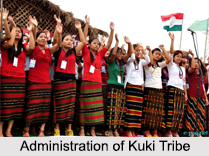 Administration of Kuki Tribes which is seen in Manipur is primarily based on the primitive structure of tribal community which largely depends on a responsible chief for its administration. The villages are the highest political unit of the Kuki tribe which includes a Chief as the supreme authority of the village, Council of Ministers which functions within the territorial jurisdiction of the village, the village priest who is considered to be the last authority on religious terms, the blacksmith and the village labour corps. Overall the administration of Kuki tribe cannot be restricted to governance only; rather it includes all the political, religious, social and economic institutions which are the integral part of the Kuki administration.
Administration of Kuki Tribes which is seen in Manipur is primarily based on the primitive structure of tribal community which largely depends on a responsible chief for its administration. The villages are the highest political unit of the Kuki tribe which includes a Chief as the supreme authority of the village, Council of Ministers which functions within the territorial jurisdiction of the village, the village priest who is considered to be the last authority on religious terms, the blacksmith and the village labour corps. Overall the administration of Kuki tribe cannot be restricted to governance only; rather it includes all the political, religious, social and economic institutions which are the integral part of the Kuki administration.
Chieftains of the Administration of Kuki Tribes
Administration of Kuki tribes begins with village administration which is the highest unit of Kuki administration. It primarily follows the rules laid down by the "Upa". The basic administration in the village is run by the Upa, "Naopa" and the council of ministers. Along with these the administration, includes the structure of administration which surround the village. This includes the priest of the village, blacksmith and village corps.
Upa: The Upa is the senior most member of the village. He is considered to be the head of the village as he is the senior most member of the village. The chieftainship is largely conferred upon them as they are considered to be the most honoured member of the village with a lot of experience.
Naopa: Next to the Upa is the position of the Naopa who is younger than Upa. A Naopa can run the administration only with the full consent of the Upa. The Naopa shall take decisions only with the consultation of all the council of ministers that form the next strata of Village administration of Kuki tribes.
Council of Ministers: Council of Ministers of the Chief, are also known as `Semang-Upa` or `Pachong` collectively who shall be responsible for the daily administration of the village.
Thiempu: A Thiempu of the Kuki village is one of the most important people who shall be responsible for performing all social rituals in the village. He is considered with a lot of honour and reverence in the community.
Blacksmith: Along with him another important character of the Kuki society is the blacksmith who is responsible for manufacturing all the agricultural equipments which are usually made up of iron and requires the skill of the Blacksmith.
Lawm: The Kuki tribe then includes the village labour corps also known as Lawm. This groups mainly includes all those who are able to work and can be included into the work force of the tribe. This mainly considers the economic life of the Kuki tribe.
Activities of the Administration of Kuki Tribes
Administration of the Kuki tribes includes a number of activities which are based on community welfare. The administration of the Kuki tribes which is prevalent in the villages is based on division of labour. In this, people from all age groups are involved, like teenagers and even younger boys and girls, who are trained to work for their community. They form small units known as the "Lawmpi", which is further divided into Lawm-Lai, Lawm- Neo, Lawm-Changpah, which includes the young volunteers of the village.
Administration of Kuki tribes also includes the customs like Saleng (Semai), Salu (Head of the Killed Game), Changseo, Khuotha, Khuomuol, Khuojeh, Umnit and Khouthiensuo. These are largely oriented towards showing gratitude to the chief for the services he delivers for the tribesmen. The customs like Khouthiensuo is celebrated only once a year on the completion of the year with beating of drums. Similarly, Umnit means observance of confinement at home on a particular day which usually takes place when there are mishaps in the village.
Thus the administration of Kuki tribe not only includes the institutions like the village, chieftains, etc but also the customs which reflect the unity of the community during times of celebration as well as at times of need.
















